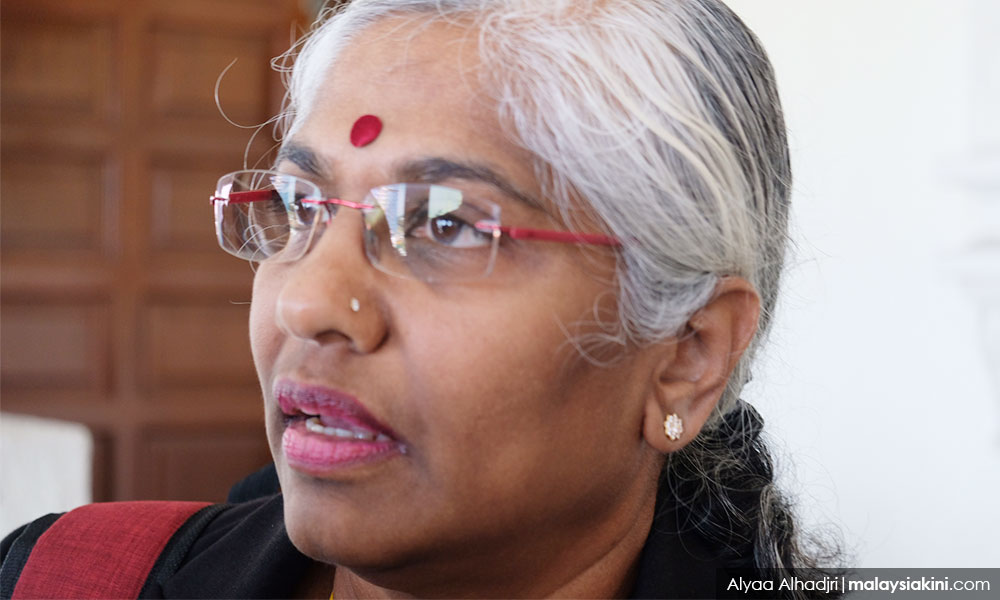The apex court will hear and determine whether the former director of the Asian International Arbitration Centre (AIAC), N Sundra Rajoo, is entitled to immunity from prosecution for acts committed while in office.
The court will also determine whether the exercise of the Attorney-General (AG)'s discretion, pursuant to Article 145 (3) of the Federal Constitution, is amenable to judicial review in appropriate circumstances.
This follows a decision by a three-member panel led by Court of Appeal president Rohana Yusuf today to allow the application by Sundra Rajoo (photo, above), charged with criminal breach of trust (CBT), for leave to appeal against the Court of Appeal’s decision that overturned a High Court ruling that he was entitled to that immunity.
"After hearing submissions from parties, we are minded to allow this application. The applicant might need to modify the questions as some are open-ended. So the application is hereby allowed," said Rohana, who presided with Federal Court judges Zaleha Yusof and Rhodzariah Bujang in the proceeding conducted via video conferencing.
The other legal question to be determined by the Federal Court is whether the High Court in judicial review proceedings has the jurisdiction and power, in appropriate cases, to grant relief, including to quash criminal charges laid by the Public Prosecutor and to issue orders of prohibition against proceedings in the subordinate courts.
The Court of Appeal had on June 25 held that the proper forum to determine Sundra Rajoo's immunity is the criminal court and not the civil court and the remedy to whether Sundra Rajoo was immune from prosecution should be tested in the criminal court after evidence has been presented by the prosecution.
The three-member panel led by Justice Hanipah Farikullah allowed the appeal brought by the Foreign Ministry, Malaysian Anti-Corruption Commission (MACC), the government and AG to set aside the Dec 31, 2019, decision of the High Court which allowed Sundra Rajoo's judicial review.
The High Court in Kuala Lumpur had allowed Sundra Rajoo's judicial review and granted him a declaration that he was immune as a former high-ranking officer of AIAC for acts done within his official capacity.

Earlier, senior federal counsel S Narkunavathy, appearing for the respondents, submitted that the application was academic as there were no criminal charges pending against Sundra Rajoo after the Court of Appeal’s decision.
"The applicant cannot seek the Federal Court to determine the issue of immunity, given that the nature of the immunity is limited to the acts and things done in his capacity. Whether something was done in his capacity as a high-ranking officer is fact and this fact will only be produced if and when the applicant is charged. To date, there are no charges against him, which is why we say it is academic," she said.
Sundra Rajoo’s lead counsel, Malik Imtiaz Sarwar, argued that the respondent failed to address the legal effect of the Court of Appeal's reversal of the High Court’s decision of allowing the judicial review application.
"The charges were quashed in view of the High Court’s decision. Given the reversal, those charges can be proffered once again. Additionally, the questions proposed by the applicant are clearly novel and in public interest. They also concern matters of high constitutionality relating to the criminal justice system and access to justice.
"Furthermore, the effect of the Court of Appeal’s decision is that high-ranking officers can no longer avoid arrest and criminal proceedings by virtue of the immunity they enjoy under the law, save where a criminal court has upheld that immunity as a statutory defence. Respectfully, this turns the scheme of immunity and privileges on its head, and undermines the rationale for such protection," said Malik Imtiaz, who was assisted by counsel K Shanmuga and Abdul Shukor Ahmad.
Sundra Rajoo, who was the head of AIAC from 2010 until late 2018, filed an application to seek leave to commence the judicial review proceedings but the High Court in March last year dismissed his application.
The Court of Appeal, had on May 23, last year, allowed Sundra Rajoo's appeal and granted him leave to commence the judicial review.
Following the appellate court's decision, the case was remitted to the High Court to hear Sundra Rajoo's judicial review.
On Jan 22 this year, Sessions Court judge Azura Alwi struck out the three CBT charges involving AIAC funds amounting to more than RM1 million against Sundra Rajoo after ruling that she was bound by the High Court’s decision that he was entitled to immunity from prosecution for acts done in his official capacity.
- Bernama




No comments:
Post a Comment
Note: Only a member of this blog may post a comment.